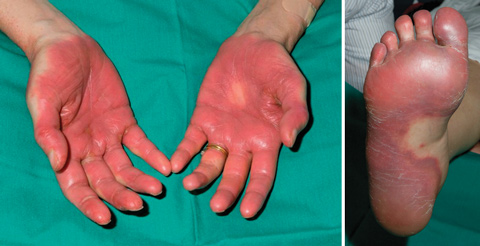A woman with metastatic breast cancer developed diarrhoea, vomiting, and hand and foot discomfort within about 10 days of ceasing therapy with capecitabine and starting docetaxel therapy. The palms of both hands and feet were inflamed and tender, with confluent blanching erythematous areas (Figure). Extensive desquamation occurred from Day 12 to Day 19 after admission, with return to normal skin by Day 30.
Hand–foot syndrome has been reported after therapy with various antineoplastic agents, most commonly cytarabine, liposomal doxorubicin, capecitabine, 5-fluorouracil, sorafenib and sunitinib. Increased metabolism of capecitabine in the palms may contribute to the local reaction;1 as may the concentration of docetaxel in eccrine glands in the palms and soles.2 Management involves stopping therapy with the implicated drug, analgesia, and preventing superinfection.
- Chitra Sivaramamoorthy1
- Eddy S Thientosapol2
- Martin H Tattersall3
- Department of Medical Oncology, Sydney Cancer Centre, Royal Prince Alfred Hospital, Sydney, NSW.
- 1. Milano G, Etienne-Grimaldi MC, Mari M, et al. Candidate mechanisms for capecitabine-related hand–foot syndrome. Br J Clin Pharmacol 2008; 66: 88-95.
- 2. Eich D, Scharffetter-Kochanek K, Eich HT, et al. Acral erythrodysesthesia syndrome caused by intravenous infusion of docetaxel in breast cancer. Am J Clin Oncol 2002; 25: 599-602.





